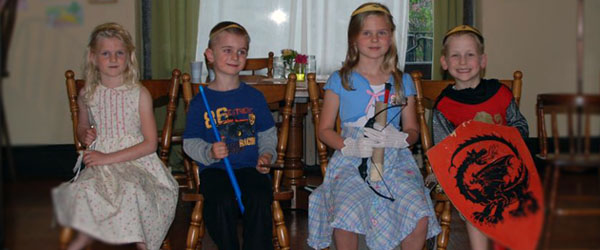Quick, what’s a doctor like?
Smart? Friendly? Caring? Clean?
What’s a teacher like?
Stern? Patient? Funny?
What about a policeman? Cowboy? Priest? Magician? Mother?
From an early age, we come to understand people by the roles they play. It doesn’t seem to matter that people themselves are unique – we expect doctors to be clever, firefighters to be brave, and teachers to be kind. Daddies we expect to be strong (but my dad could whip yours), and Mommies to be caring. When we step into a new area of responsibility, whether it’s attending kindergarten or teaching it, we often look to our understanding of these roles to tell us how we should acquit ourselves.
This is not always necessarily good, but it seems a common part of being human, and I think it’s a great example of how children learn by imagination.
It is sometimes startling to see the change in my high-energy, high-volume, highly-strung daughter when she plays at being mamma to her dolls. As she imagines herself to be a gentle, caring mother, those virtues – still mostly undeveloped at her age – are displayed in her behavior. When my son plays at being Robin Hood, he acts with strength and kindness, and rehearses a kind of virtuous manliness I am glad to see.
Of course nothing is perfect. At our house, Robin Hood gets bored with robbing the rich, and settles for mugging whomever’s nearest. But I think it’s a refreshing change of pace when, instead of saying (again) that he should “love [his] sisters,” I can say, “be like the real Robin Hood.” It gives him a specific goal, and is a way to encourage the good things God may be doing in his heart.
I encourage my children to engage the world by thinking about the roles we all play. Because, while we are much more than the sum of our roles (more on that later), we are not less.
- In Conversation With Michael J. Tinker: Getting to the Heart of the Gospel Through Song - January 31, 2024
- All Good Books Are Alike… - December 26, 2023
- Don’t Be Original - September 25, 2023

I really love this, James.
There is some interesting research on the way role play, because it requires acting within the boundaries of a character, develops self-control in young children. Carrying it over into real life, as a gentle reminder of a way to behave, is bound to be a much more effective means of inspiring the self-discipline required for kindness, patience, courage etc. than constant repetitions of ‘you should…’ can ever provide.
Thanks, Judy. Inspiring, as well as requiring, virtue, is something I want to get better at.
My oldest son wants to be King Peter of Narnia. At one point, we had a poignant discussion about his being a role model for his brothers and sister, a role he’d repeatedly said he disliked; he preferred being free to be irresponsible without the worry of little siblings mimicking him. When I mentioned that Peter was responsible for his three younger siblings while they were in Narnia, the conversation broke wide open. He saw a new side of Peter and started living into his elder brother role in new ways, with Peter as his role model.
Thanks for this wonderful reminder of the power of role-playing in shaping our character.
Kimberlee, you’re welcome – thank you for sharing this terrific example from real life. Neat to know we’re seeing the same things!
This is so true! It’s wonderful to branch out from the “be kind to your sister” stuff and give them the chance to see strength of character, self-sacrifice, etc. in the context of story.
Thanks, Helena!